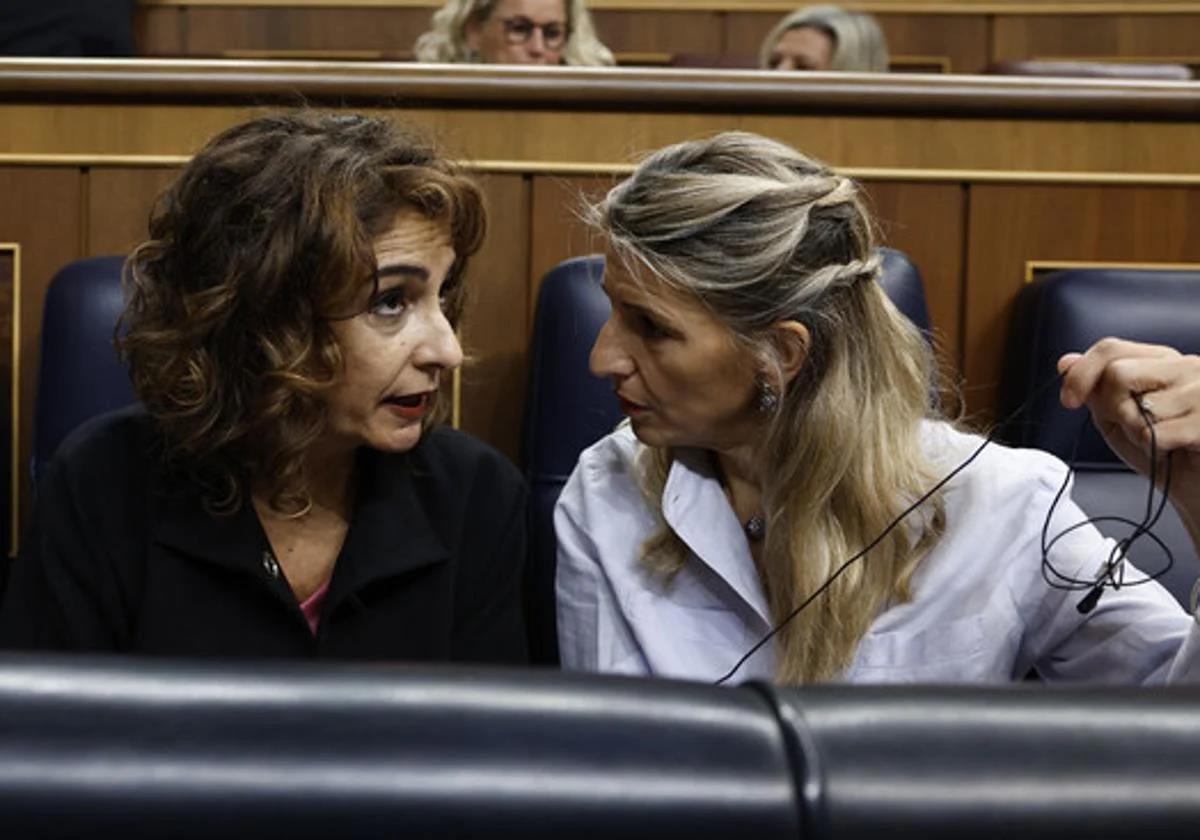Spain's annual minimum wage will increase by 700 euros in 2025, but the tax authorities will retain up to 300
Deputy prime minister María Jesús Montero has refused to update the IRPF personal income tax rules which means that 20% of the 2.4 million beneficiaries will have to pay taxes for the first time
The Spanish government has approved a new 4.4% increase in the minimum wage, which raises it to 1,184 euros in 14 payments, 50 euros more per month, on Tuesday 11 February. This means a total of 700 euros more per year, from which 2.4 million workers will benefit, although in some cases the Treasury will keep up to 300 euros, depending on the personal circumstances of each individual. This implies that 42% of the annual increase will not reach the beneficiary.
Starting immediately, and after the legal loophole created when the congress rejected the omnibus decree and annulled the 2024 minimum wage extension, the minimum wage for full-time employment is set at 16,576 euros gross per year.
"Today we are taking a historic step in this new rise in the minimum wage," said Yolanda Díaz, second deputy prime minister. She celebrated the "historic rise" of 61% that the current government has made since 2018, when it stood at 735 euros. "It suits Spain very well to raise the SMI (the minimum wage). Contrary to everything that has been written and spread, raising the minimum wage is not a threat to Spain, but the best thing for the country to move in the right direction. Let's say that the history of the SMI in our country is a success story," stated Díaz.
However, their joy at this new rise translated as clear national disappointment after it was announced that, for the first time in history, the minimum wage will not be exempt from paying tax to the Treasury. Contrary to what had happened until now, workers who earn the lowest income, although not all of them, will have to file income tax returns and pay taxes. Whether an individual would be required to pay taxes will depend on their personal circumstances. According to the Treasury, the percentage of people who will have to file tax reports will be minimum.
First deputy PM María Jesús Montero has stood firm with Díaz in this battle and has refused to update the personal income tax (IRPF) threshold to 16,576 euros. Until now, every year, the Treasury was raising the IRPF in line with the minimum wage, so that it would be exempt from all taxes, but the successive rises in the SMI, more than 60% since 2018, justify for Montero that it is no longer necessary to do so. It is "an increase well above inflation. Never before has the SMI risen with such intensity", said Montero.
Fewer taxes for those with children
The Treasury argues that most of the minimum-wage workers will continue to be exempt from the IRPF and will pay nothing because "the Government has already approved the largest reduction in personal income tax for low and medium incomes". According to the experts who recommended a rise between 39 and 50 euros per month, only 20% of the 2.4 million beneficiaries, around half a million, will pay a maximum tax of 300 euros per year.
Whether an employee will be taxed will depend on personal circumstances, such as marital status and number of children. For example, a taxpayer with a partner and a child under the age of three will not have any income tax withheld, but if the child is three years old or older, the parent will have to pay 99 euros per year to the tax authorities. However, the highest tax will be charged to those who are single and childless and earn 1,184 euros per month in 14 payments. The personal income tax for this profile of employee will be 300 euros.
Therefore, the Treasury will collect a maximum of around 150 million euros (the result of multiplying the maximum tax by the half a million people affected) from the taxation of these workers over the course of 2025.
This decision has generated disputes between the two parties within the government, with the opposition unequivocally criticising the decision. Trade unions also opposed to it, as it does not move towards a "fairer and more egalitarian" society.
Very limited effect
According to Gestha (the union of the Treasury finance technicians), the new decision will only affect people earning between 15,876 and 16,578 euros per year, who are single or separated, without children or personal or family burdens, or married couples filing a single tax return with up to one shared child. All other situations are currently non-taxable. Workers who do not pay withholding tax and earn less than 22,000 euros a year, such as domestic workers, will also be exempt from IRPF.
Sumar, a left-wing political group, like Gestha, has stated that this limited effect of the decision justifies exempting workers and pensioners earning the minimum wage, not the rest.

